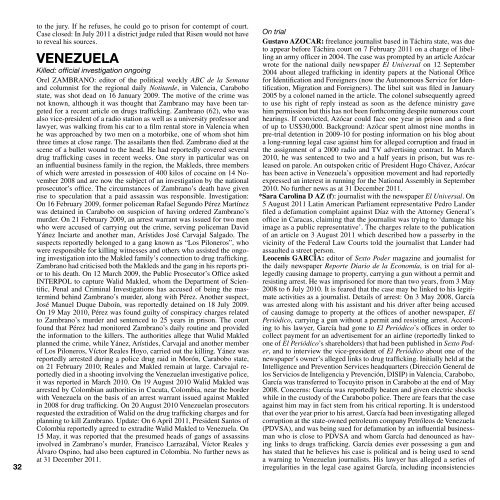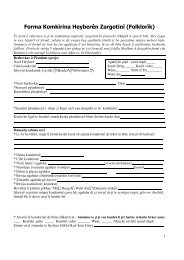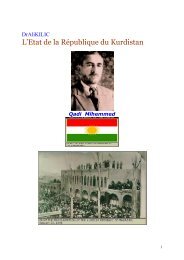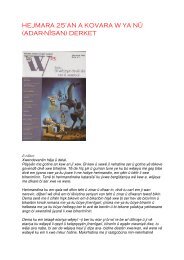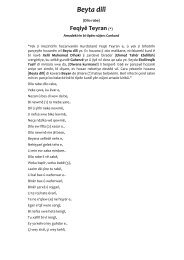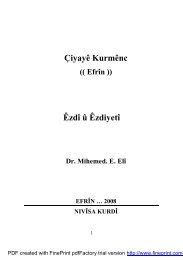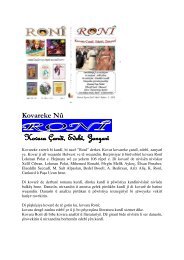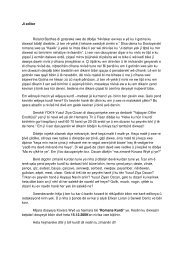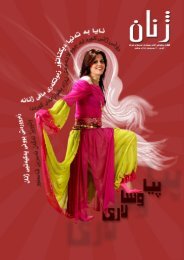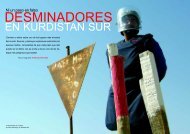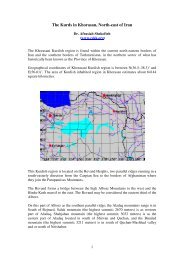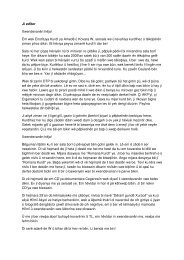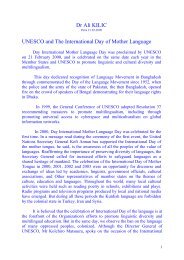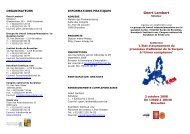Caselist - PEN International
Caselist - PEN International
Caselist - PEN International
Create successful ePaper yourself
Turn your PDF publications into a flip-book with our unique Google optimized e-Paper software.
32to the jury. If he refuses, he could go to prison for contempt of court.Case closed: In July 2011 a district judge ruled that Risen would not haveto reveal his sources.VENEZUELAKilled: official investigation ongoingOrel ZAMBRANO: editor of the political weekly ABC de la Semanaand columnist for the regional daily Notitarde, in Valencia, Carabobostate, was shot dead on 16 January 2009. The motive of the crime wasnot known, although it was thought that Zambrano may have been targetedfor a recent article on drugs trafficking. Zambrano (62), who wasalso vice-president of a radio station as well as a university professor andlawyer, was walking from his car to a film rental store in Valencia whenhe was approached by two men on a motorbike, one of whom shot himthree times at close range. The assailants then fled. Zambrano died at thescene of a bullet wound to the head. He had reportedly covered severaldrug trafficking cases in recent weeks. One story in particular was onan influential business family in the region, the Makleds, three membersof which were arrested in possession of 400 kilos of cocaine on 14 November2008 and are now the subject of an investigation by the nationalprosecutor’s office. The circumstances of Zambrano’s death have givenrise to speculation that a paid assassin was responsible. Investigation:On 16 February 2009, former policeman Rafael Segundo Pérez Martínezwas detained in Carabobo on suspicion of having ordered Zambrano’smurder. On 21 February 2009, an arrest warrant was issued for two menwho were accused of carrying out the crime, serving policeman DavidYánez Inciarte and another man, Arístides José Carvajal Salgado. Thesuspects reportedly belonged to a gang known as “Los Piloneros”, whowere responsible for killing witnesses and others who assisted the ongoinginvestigation into the Makled family’s connection to drug trafficking.Zambrano had criticised both the Makleds and the gang in his reports priorto his death. On 12 March 2009, the Public Prosecutor’s Office askedINTERPOL to capture Walid Makled, whom the Department of Scientific,Penal and Criminal Investigations has accused of being the mastermindbehind Zambrano’s murder, along with Pérez. Another suspect,José Manuel Duque Daboín, was reportedly detained on 18 July 2009.On 19 May 2010, Pérez was found guilty of conspiracy charges relatedto Zambrano’s murder and sentenced to 25 years in prison. The courtfound that Pérez had monitored Zambrano’s daily routine and providedthe information to the killers. The authorities allege that Walid Makledplanned the crime, while Yánez, Arístides, Carvajal and another memberof Los Piloneros, Víctor Reales Hoyo, carried out the killing. Yánez wasreportedly arrested during a police drug raid in Morón, Carabobo state,on 21 February 2010; Reales and Makled remain at large. Carvajal reportedlydied in a shooting involving the Venezuelan investigative police,it was reported in March 2010. On 19 August 2010 Walid Makled wasarrested by Colombian authorities in Cucuta, Colombia, near the borderwith Venezuela on the basis of an arrest warrant issued against Makledin 2008 for drug trafficking. On 20 August 2010 Venezuelan prosecutorsrequested the extradition of Walid on the drug trafficking charges and forplanning to kill Zambrano. Update: On 6 April 2011, President Santos ofColombia reportedly agreed to extradite Walid Makled to Venezuela. On15 May, it was reported that the presumed heads of gangs of assassinsinvolved in Zambrano’s murder, Francisco Larrazábal, Víctor Reales yÁlvaro Ospino, had also been captured in Colombia. No further news asat 31 December 2011.On trialGustavo AZOCAR: freelance journalist based in Táchira state, was dueto appear before Táchira court on 7 February 2011 on a charge of libellingan army officer in 2004. The case was prompted by an article Azócarwrote for the national daily newspaper El Universal on 12 September2004 about alleged trafficking in identity papers at the National Officefor Identification and Foreigners (now the Autonomous Service for Identification,Migration and Foreigners). The libel suit was filed in January2005 by a colonel named in the article. The colonel subsequently agreedto use his right of reply instead as soon as the defence ministry gavehim permission but this has not been forthcoming despite numerous courthearings. If convicted, Azócar could face one year in prison and a fineof up to US$30,000. Background: Azócar spent almost nine months inpre-trial detention in 2009-10 for posting information on his blog abouta long-running legal case against him for alleged corruption and fraud inthe assignment of a 2000 radio and TV advertising contract. In March2010, he was sentenced to two and a half years in prison, but was releasedon parole. An outspoken critic of President Hugo Chávez, Azócarhas been active in Venezuela’s opposition movement and had reportedlyexpressed an interest in running for the National Assembly in September2010. No further news as at 31 December 2011.*Sara Carolina DĺAZ (f): journalist with the newspaper El Universal. On5 August 2011 Latin American Parliament representative Pedro Landerfiled a defamation complaint against Díaz with the Attorney General’soffice in Caracas, claiming that the journalist was trying to ‘damage hisimage as a public representative’. The charges relate to the publicationof an article on 3 August 2011 which described how a passerby in thevicinity of the Federal Law Courts told the journalist that Lander hadassaulted a street person.Leocenis GARCÍA: editor of Sexto Poder magazine and journalist forthe daily newspaper Reporte Diario de la Economía, is on trial for allegedlycausing damage to property, carrying a gun without a permit andresisting arrest. He was imprisoned for more than two years, from 3 May2008 to 6 July 2010. It is feared that the case may be linked to his legitimateactivities as a journalist. Details of arrest: On 3 May 2008, Garcíawas arrested along with his assistant and his driver after being accusedof causing damage to property at the offices of another newspaper, ElPeriódico, carrying a gun without a permit and resisting arrest. Accordingto his lawyer, García had gone to El Periódico’s offices in order tocollect payment for an advertisement for an airline (reportedly linked toone of El Periódico’s shareholders) that had been published in Sexto Poder,and to interview the vice-president of El Periódico about one of thenewspaper’s owner’s alleged links to drug trafficking. Initially held at theIntelligence and Prevention Services headquarters (Dirección General delos Servicios de Inteligencia y Prevención, DISIP) in Valencia, Carabobo,García was transferred to Tocuyito prison in Carabobo at the end of May2008. Concerns: García was reportedly beaten and given electric shockswhile in the custody of the Carabobo police. There are fears that the caseagainst him may in fact stem from his critical reporting. It is understoodthat over the year prior to his arrest, García had been investigating allegedcorruption at the state-owned petroleum company Petróleos de Venezuela(PDVSA), and was being sued for defamation by an influential businessmanwho is close to PDVSA and whom García had denounced as havinglinks to drugs trafficking. García denies ever possessing a gun andhas stated that he believes his case is political and is being used to senda warning to Venezuelan journalists. His lawyer has alleged a series ofirregularities in the legal case against García, including inconsistenciesin police statements on how his arrest came about. On 20 May 2010,García’s detention was extended by one year, following a request by thePublic Prosecutor’s Office. His preliminary hearing had been suspendedmore than 70 times. Release: On 6 July 2010, the court ordered García’srelease after 26 months’ detention without trial. According to García’slawyer, the release came as a result of an injunction. García was reportedlytransferred to a health centre on his release from prison as he hadspent seven days on hunger strike, during which time he had reportedlynot received any medical attention. Trial: In April 2011, García’s lawyerclaimed that the judge presiding over the case is biased against his clientand requested that he be replaced. On 10 June it was reported that thejudge had eventually agreed to step down after repeated requests. Trialongoing. No further news as at 31 December 2011.*Dinorah GIRON (f) and Leocenis GARCIA (see above): respectivelypublisher and editor of Sexto Poder were charged with ‘inciting hatred,insulting officials and offending women,’ a criminal offence underVenezuela’s penal code. The charges related to a satirical photomontagepublished on 20 August 2011, which showed the heads of senior femaleofficials imposed on the bodies of cabaret dancers. García handed himselfin to the authorities in the Western city of Maracaibo on 30 Augustand was immediately transferred to the headquarters of the BolivarianIntelligence Service (SEBIN). On 1 September 2011 the court decidedthat Garcia was to be incarcerated pending the start of his trial. Garciawas held in solitary confinement. He was given conditional release in lateNovember 2011. Girón was arrested and released pending trial, althoughshe was required to attend court every 15 days, and was prohibited fromleaving the country and from attending public gatherings.AttackedÓscar TARAZONA: journalist for the newspaper El Mío in Puerto LaCruz. Was beaten and then briefly detained on 03 August 2011 in thenorthern state of Anzoátegui. Tarazona claimed that after leaving thenewspaper’s offices he found a number of police officers standing next tohis cousin’s car. When he asked them what was happening the police beathim and then brought him to the station, where he was detained for a briefperiod. He alleged that the officers mocked him saying that “journalistsbelieve they are untouchable.” Tarazona filed a complaint; however, thestate’s chief of police has said that he stands by his officers.ASIA PACIFICBANGLADESHOn trial, free on bail*Mohammad Ekramul HAQUE: Owner and editor of the online newspaperSheershanews.com and the weekly Sheersha Kagoj. Was arrestedat his home on 31 July 2011, by plain-clothes officers on a charge ofextortion which is believed to be fabricated. His colleagues believe thatthe charge is a reprisal for the newspapers’ reports on corruption issues.The Dhaka high court’s 25 October order for Haque to be released onbail was carried out on 1 November 2011. However, he was immediatelyre-arrested on the basis of a new complaint against him filed earlier thatday at the Ramna police station. Release: According to Media Watch,Haque was released on bail on 25 November 2011.Case closedSalah Uddin Shoaib CHOUDHURY: Editor of the tabloid weekly Blitz.Arrested on 29 November 2003 by security personnel at Zia <strong>International</strong>Airport in Dhaka. He was reportedly on his way to Israel to participate ina conference with the Hebrew Writers Association when he was arrested.Choudhury is believed to have been going to address a writers’ symposiumin Tel Aviv entitled Bridges Through Culture, and was scheduled to speakabout the role of the media in establishing peace. Choudhury is known forhis attempts to improve relations between Muslim countries and Israel,and has written articles against anti-Israeli attitudes in Muslim countriesand about the rise of al-Qaeda in Bangladesh, which had reportedlysparked debate in the Bangladeshi press and government prior to hisarrest. Choudhury was accused of spying for Israel, and was repeatedlydenied a bail hearing. He was released on bail on 2 May 2005 followingappeals by <strong>PEN</strong> USA. His trial started on 5 April 2006, though is thoughtunlikely to progress through the courts. Choudhury continues as editorof Blitz and remains under pressure from the government and extremistgroups for his critical writings. In October 2009 Blitz published a bookwritten by Choudhury, on the rise of Jihadists in Islamic educationschools. No further information as of 31 December 2011. Case closed.Mahmudur RAHMAN: Acting director of the Bengali-languageand opposition newspaper Amar Desh, was reportedly arrested atthe newspaper’s office on 2 June 2010 and charged with fraud, libel,obstructing the police and sedition. Thought to be targeted for criticalarticles published in Amar Desh, which is known for its reporting onextra-judicial killings, corruption, and suppression of freedom ofexpression. Sentenced by the Bangladeshi Supreme Court on 19 August2010 to six months in jail for contempt of court and fined Tk 100,000(US$1,436). Freed on 17 March 2011, after spending over nine monthsin detention. Another arrest warrant was reportedly issued for him on 29March 2011, just two weeks after he was released from prison. He is saidto be accused of libelling senior Awami League officials in the southerntown of Kotalipara. The Awami League has governed Bangladesh since2008. No further information as of end December 2011 and Rahmanremains free, case closed.CHINAImprisoned: Main cases*CHEN WeiD.o.b.: 21 February 1969 Profession: Freelance writer and activist. Dateof arrest: 21 February 2011 Sentence: Nine years in prison Expires:20 February 2020 Details of arrest: Reportedly arrested on 21 February2011 as part of a crackdown on human rights defenders and activistsacross the country, apparently in response to anonymous calls for‘Jasmine Revolution’ protests. Formally arrested on 28 March 2011, bythe Public Security Bureau of Suining City, Sichuan Province, on chargesof “suspicion of inciting subversion of state power” for several essayspublished online on overseas websites calling for freedom of speech andpolitical reform. Details of trial: Convicted of ‘inciting subversion ofstate power’ at a closed two-hour trial on 23 December 2011 for sevenpassages in four essays criticizing the Chinese political system and praisingthe development of civil society. Place of detention: Detention Centerof Suining City, Sichuan Province. Previous political imprisonment/ 33


